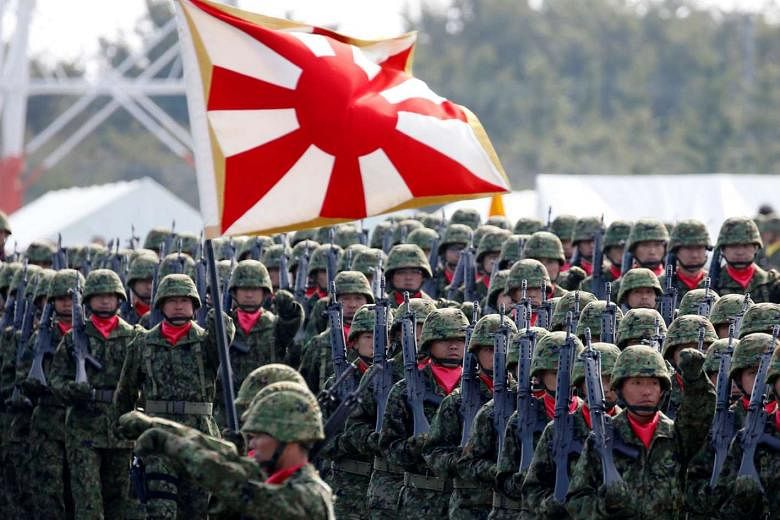Japan's military has been given its first order under controversial new security laws concerning the use of weapons that took effect in March.
It will be its duty to rescue United Nations (UN) staff and employees of non-profit groups working as part of peacekeeping operations in conflict-torn South Sudan if they were to come under siege, the order yesterday said.
The use of weapons by Japan's Self-Defence Forces (SDF) has so far been strictly confined to protecting their own base, even in UN missions. But with the new order, SDF troops can fire warning shots at rioters or an armed group. They can also return fire if friendly forces come under attack, or if they feel that lives are under threat.
The troops will also protect UN peacekeepers' camps by jointly defending these areas with troops from other countries, even if they do not come under siege.
The decision for this new order was made at a Cabinet meeting in Tokyo yesterday and will apply to SDF forces to be deployed in South Sudan this Sunday.
This is allowed under contentious laws enacted in March that reinterpreted Japan's post-war pacifist Constitution to allow its military the right to exercise collective self-defence, and to go to the aid of ally nations under attack.
It is unconstitutional for Japan's military to engage in combat action in international armed conflicts. But Tokyo does not recognise the situation in South Sudan as an "armed conflict", saying both government and rebel forces have the will to seek a peaceful resolution.
Prime Minister Shinzo Abe told the Diet yesterday: "South Sudan cannot assure its peace and stability on its own, and for that very reason, a UN peacekeeping operation is being conducted.
"The SDF is carrying out activities that only it can do in a tough environment."
Critics argue that the new laws take the first step towards thrusting Japanese troops into combat action abroad for the first time since World War II.
South Sudan gained independence from Sudan in 2011, and Japan's SDF forces have been deployed there since 2012 as part of a UN peacekeeping mission to build roads and other infrastructure.
Despite a peace deal between government and rebel forces in August last year, renewed fighting in July this year killed more than 270 people.
Emeritus professor Shinya Murase of Tokyo's Sophia University said the latest order is a logical next step following the legal changes. He told The Straits Times that there were instances under the old law where "foreign troops located nearby requested Japan to protect them, but Japan said, 'Sorry, we cannot protect you because our law does not permit our use of weapons outside our base. If you come to our base, we can protect you'".
"This is absurd," said Prof Murase, who served on a Security Legislation Panel convened by Mr Abe in 2014. "This is part of the UN and each unit is supposed to be under the integrated UN command."
The order also comes amid talk that Tokyo is working to rewrite its Constitution so as to give its military even greater powers.
But noting that the Japanese are risk-averse, military expert Chiyuki Aoi of the University of Tokyo said: "If something bad happens - such as casualties - on the South Sudan mission... it might stop or slow down the future evolution in the legal framework."

